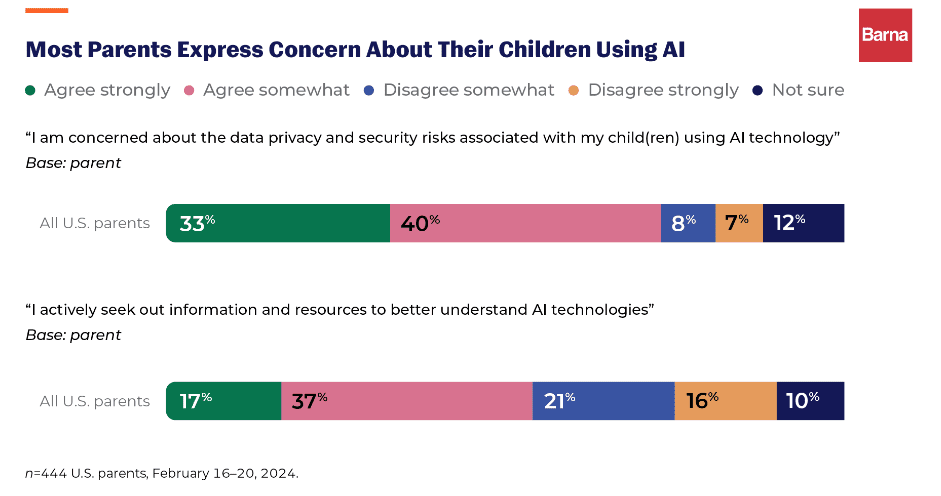EDITORIAL
Barna Trends | David Kinnaman
 We are living in a period of tremendous, magic-like digital revolution. Christian leaders need to be prepared to help people think and live faithfully for Jesus amid these trends.
We are living in a period of tremendous, magic-like digital revolution. Christian leaders need to be prepared to help people think and live faithfully for Jesus amid these trends.
Equipping parents is one such example. Parents believe it is harder than ever to raise children. The No. 1 reason? Technology. That was a key finding at the heart of The Tech-Wise Family, a book Andy Crouch co-published with Barna in 2017. Seven years later, parents continue to report the same tech-driven vexation.
Recent data from a Barna survey conducted in partnership with Gloo for its AI & the Church Initiative reveals that a third of U.S. parents (33%) strongly agree they are concerned about the data privacy and security risks associated with their child using AI technology. One in four (25%) strongly agree that their child using AI “could negatively impact their ability to think for themselves.”
Despite these concerns, many parents admit they aren’t actively trying to learn more about artificial intelligence. Just one in six U.S. parents (17%) strongly agree they intentionally seek to better understand AI. Meanwhile, their kids are eagerly embracing AI and other emerging technologies.
For parents to guide their children through today’s digital landscape, moms and dads will need to swiftly join them in learning about AI so they can discern the impacts and appropriate use of these powerful tools for their kids.
Christian leaders are mostly on the sidelines of this significant trend: only 11% of Christians see their pastors as someone to help them learn more about AI, and just over one in 10 Christians wants to hear from their pastor on developing a theology of AI usage (13%) or learn how AI can be used to grow in their faith (13%). Perhaps reflecting this minimal appetite, only 14% of pastors feel this topic is important enough to warrant teaching.
This lack of interest may, in part, reflect Christians’ larger changing relationships to churches. In short, they are not always sure if pastors have relevant information for life outside of “spiritual” topics—yet, everything, even technology, contains a spiritual dimension. There is some consolation in the fact that pastors don’t need to become an AI expert overnight—nor ensure their church is on board with all things AI. Instead, pastors may want to focus more on guiding congregants on the spiritual, theological and interpersonal aspects of AI, helping them discern appropriate use of AI where we live, work, play and worship.
Finally, younger generations are more eager to see the church address AI. Over half of Gen Z Christians (57%) would like to hear from their pastor on using AI. At the same time, 44% of Gen X Christians and 36% of Christian boomers wanted to hear from their pastor on “using AI wisely.” This seems to present a potential opportunity to disciple congregants in a relevant and needed way.
As never before, Christian leaders and the people they serve are wrestling with what it means to follow Jesus in the digital age. It’s increasingly essential to know how to live “a tech-wise life.” The research is clear: Understanding what AI means for ministry and all domains of life will be vitally important to the future of the church and our communities.
Living and leading well in this digitally enabled era is about more than keeping up. It’s about faithfully approaching the challenges and opportunities of our time, so we each can experience personal flourishing, community transformation and a renewed church.


